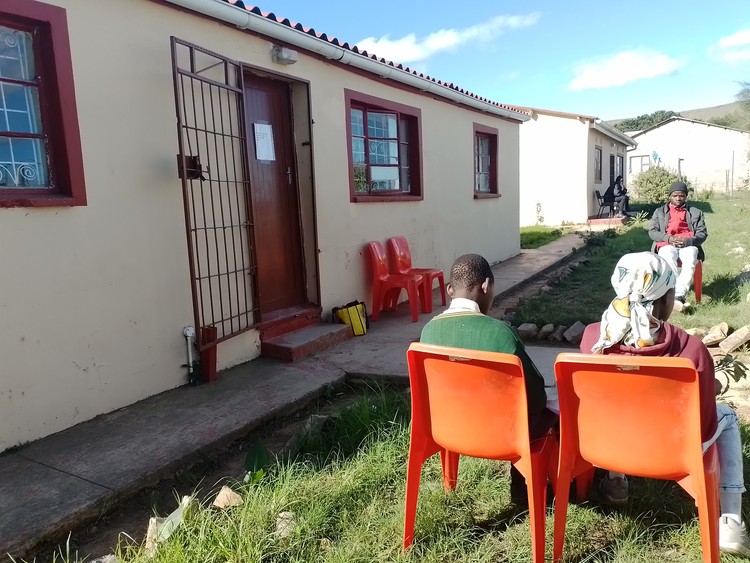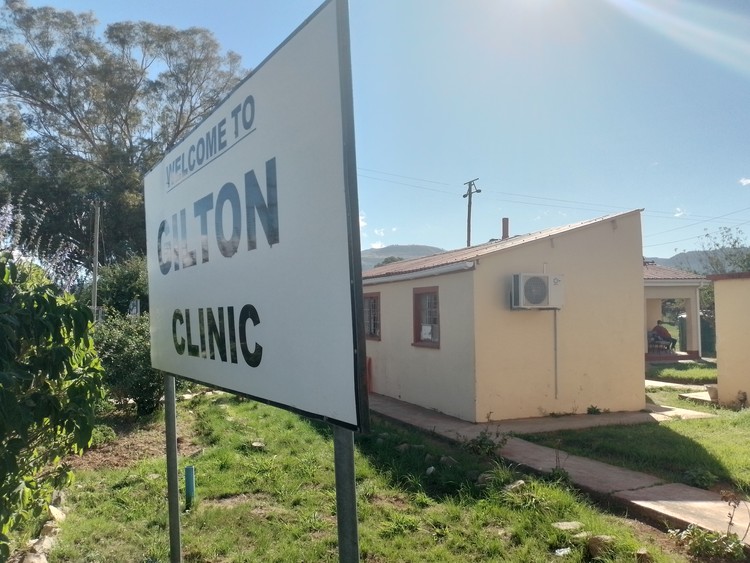Eastern Cape clinic serving a dozen villages is falling apart
Patients at Gilton clinic complain of medication shortages, broken medical equipment, no proper furniture, staff shortages and high patient volume.
The Gilton Clinic in Dikeni (formerly Alice) serves more than a dozen villages surrounding the Eastern Cape town, but has no proper waiting area inside or outside the clinic. This is just one of the many issues noted by patients. Photos: Sandiso Phaliso
- The Gilton Clinic in the Eastern Cape town of Dikeni (formerly Alice) has two nurses who serve people from more than a dozen villages daily.
- The clinic was originally built as a four-room house in 1964. It was turned into a clinic after 1994, and the only renovations have been to the exterior.
- There is no proper water supply, and the toilets do not work.
The Gilton Clinic in Dikeni (formerly Alice) serves more than a dozen villages in the Eastern Cape town, but it is falling apart.
The clinic was originally built as a four-room house in 1964. It was turned into a clinic after 1994, and no major renovations had taken place until January this year when some work was done on the clinic’s exterior. But many residents we spoke to say this is not enough to improve their experience at the clinic.
The clinic has had intermittent water supply because it is not formally connected to the municipal system. The toilets have also been out of order for years.
The clinic does not have a waiting area inside, so patients wait outside for their names to be called. There is also no shelter outside, so sick patients remain exposed to the weather as they wait outside. The roof is made of asbestos and the grass around the clinic is overgrown.
Patients we spoke to complained of medication shortages, broken medical equipment, no proper furniture, staff shortages and high patient volume. There are only two staff nurses who treat about 50 patients per day, with a doctor visiting the clinic once every three months. They want the department to tear down this clinic and build a new one.
“What is happening at this facility is unacceptable. The sooner something is done, the better for patients and staff,” said patient Kholeka Melani.
“The infrastructure is not maintained and the structure is a health hazard to staff working there as well as patients. This clinic is slowly falling apart. We feel less human coming here,” said Melani.
A staff member, who did not want to be named, told GroundUp they often open the clinic late during the winter because public transport to Dikeni is unreliable. “The bus does not come this side when it rains because the roads are not suitable. We have to hire private cars at the last minute and that makes us late to come to the clinic.”
The staff member said they are overworked and are generally not able to take sick leave. “We work here because we love what we do, and we need the job,” said a nurse.
Originally a house, the Gilton Clinic in Dikeni is no longer fit for purpose.
Community leader Nqabayomzi Phika said that when they complain about the conditions at the clinic, they are sent from pillar-to-post by officials. “Just because we live in the villages, we are being taken for granted,” said Phika.
Mkhululi Ndamase, spokesperson for Eastern Cape Health MEC Nomakhosazana Meth, told GroundUp the clinic is part of the long-term refurbishment plans to get health facilities across the country up to the benchmark for the National Health Insurance (NHI).
“This, however, will not be achieved overnight as the department has budgetary constraints,” he said.
Ndamase said in January the department installed new door locks, plastered and painted, waterproofed the roof and bought three 5,000l water tanks. But we could only see the water tanks and that the paint was new. Most of the rooms and furniture were still old and falling apart.
But Phika said unless it rains or the municipality commissions a truck to bring water, the water tanks stand empty most of the time.
Asked about the asbestos roof, Ndamase said, “In terms of the Asbestos Abatement Regulations, the department is required to assess the possible asbestos containing materials at a facility. This must be done by an appointed Approved Inspection Authority,” Ndamase said. But this has not yet happened.
“If there is confirmation that asbestos is present, a risk assessment of that material must be conducted. If it is deemed that the asbestos containing material is unsafe, the department will remove the asbestos. This assessment will be done before the end of the year,” said Ndamase.
Support independent journalism
Donate using Payfast

Don't miss out on the latest news
We respect your privacy, and promise we won't spam you.
Next: SG Convenience workers down tools for 15% increase
Previous: Councillor denies giving people permission to occupy land in Johannesburg
© 2024 GroundUp. This article is licensed under a Creative Commons Attribution-NoDerivatives 4.0 International License.
You may republish this article, so long as you credit the authors and GroundUp, and do not change the text. Please include a link back to the original article.
We put an invisible pixel in the article so that we can count traffic to republishers. All analytics tools are solely on our servers. We do not give our logs to any third party. Logs are deleted after two weeks. We do not use any IP address identifying information except to count regional traffic. We are solely interested in counting hits, not tracking users. If you republish, please do not delete the invisible pixel.


